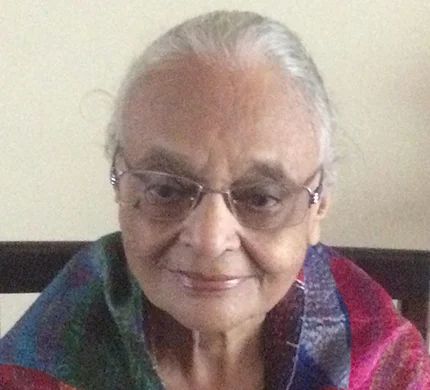
.
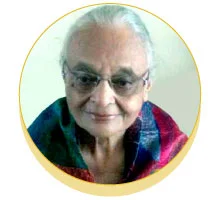
Nargis Panchapakesan
Former Dean and Head, Central Institute of Education, University of Delhi
Professor Nargis Panchapakesan, one of the pioneering educationists in India, completed her doctoral degree in education from the University of Chicago. She holds a master degree in physics and taught physics in India and USA. She was the only woman student pursuing a master’s degree in physics at Miranda House, University of Delhi.
Professor Panchapakesan was admitted to the University of Chicago as a doctoral student in Physics but changed to Education. She worked on her doctoral research with Ben Wright to develop effective estimation procedures for Rasch measures in Mental Measurement. The work culminated in a widely cited paper: Wright, B., & Panchapakesan, N. (1969). A procedure for sample-free item analysis. Educational and Psychological measurement, 29(1), 23-48. Referred to as the Wright-Panchapakesan procedure for sample-free item analysis, based on Rasch’s simple logistic response model, this has since been incorporated in several computer programs for item analysis and used widely.
Professor Panchapakesan served as Dean and Head of the Central Institute of Education twice from 1991-1994 and 1997-1998. She has played a key role in the conception and implementation of the Bachelor of Elementary Education programme at the University of Delhi. She has various honours and contributions to her credit including: Chair of the Governing Body, Gargi college, University of Delhi; Chair of the Governing Body, Durgabai Deshmukh College of Special Education, member of the Central Advisory Board of Education (CABE) sub-Committee set up for the Implementation of CCE in the context of the No detention provision. She has served on the Board of the Indian Education Review; was member of the Task Force on Restructuring of the National Council for Teacher Education (NCTE); and has been member of several other committees of the NCTE.
Nargis Panchapakesan
Former Dean and Head, Central Institute of Education, University of Delhi
.

Nargis Panchapakesan
Former Dean and Head, Central Institute of Education, University of Delhi
Professor Nargis Panchapakesan, one of the pioneering educationists in India, completed her doctoral degree in education from the University of Chicago. She holds a master degree in physics and taught physics in India and USA. She was the only woman student pursuing a master’s degree in physics at Miranda House, University of Delhi.
Professor Panchapakesan was admitted to the University of Chicago as a doctoral student in Physics but changed to Education. She worked on her doctoral research with Ben Wright to develop effective estimation procedures for Rasch measures in Mental Measurement. The work culminated in a widely cited paper: Wright, B., & Panchapakesan, N. (1969). A procedure for sample-free item analysis. Educational and Psychological measurement, 29(1), 23-48. Referred to as the Wright-Panchapakesan procedure for sample-free item analysis, based on Rasch’s simple logistic response model, this has since been incorporated in several computer programs for item analysis and used widely.
Professor Panchapakesan served as Dean and Head of the Central Institute of Education twice from 1991-1994 and 1997-1998. She has played a key role in the conception and implementation of the Bachelor of Elementary Education programme at the University of Delhi. She has various honours and contributions to her credit including: Chair of the Governing Body, Gargi college, University of Delhi; Chair of the Governing Body, Durgabai Deshmukh College of Special Education, member of the Central Advisory Board of Education (CABE) sub-Committee set up for the Implementation of CCE in the context of the No detention provision. She has served on the Board of the Indian Education Review; was member of the Task Force on Restructuring of the National Council for Teacher Education (NCTE); and has been member of several other committees of the NCTE.
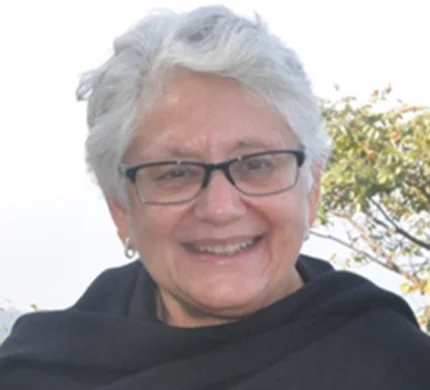
.
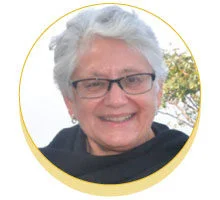
Anshu Vaish
Former Secretary, Education, MHRD
Ms. Anshu Vaish, an Indian Administrative Service officer of the batch of 1975, Madhya Pradesh Cadre, superannuated as Secretary, School Education and Literacy in the Ministry of Human Resource Development, Government of India. Prior to that, she has worked extensively in the social sector, including culture and school education, serving in the Departments of Women and Child Development, Health, Social Justice and Empowerment. She has also headed the Archaeological Survey of India as its Director General.
Ms. Anshu Vaish has been involved in various assignments over the years. She chaired the Task Force on Restructuring of the National Council for Teacher Education and was a member of NUEPA’s group to draft a Model Education Code for schools. She has served as Chairperson of Rangasri Little Ballet Troupe Trust, Chairperson of PRADAN, Member of the Governing Body of All India Institute of Medical Sciences in Bhopal, and Independent Director on the Board of Steel Authority of India.
Currently, Ms. Vaish serves as Chairperson of Rainbow Foundation of India and Member on the General Body of Centre for Equity Studies. She is also a Member on the governing bodies of KATHA, Swami Sivananda Memorial Institute, and Aga Khan Foundation India.
Anshu Vaish
Former Secretary, Education, MHRD, GoI
.
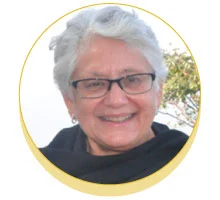
Anshu Vaish
Former Secretary, Education, MHRD
Ms. Anshu Vaish, an Indian Administrative Service officer of the batch of 1975, Madhya Pradesh Cadre, superannuated as Secretary, School Education and Literacy in the Ministry of Human Resource Development, Government of India. Prior to that, she has worked extensively in the social sector, including culture and school education, serving in the Departments of Women and Child Development, Health, Social Justice and Empowerment. She has also headed the Archaeological Survey of India as its Director General.
Ms. Anshu Vaish has been involved in various assignments over the years. She chaired the Task Force on Restructuring of the National Council for Teacher Education and was a member of NUEPA’s group to draft a Model Education Code for schools. She has served as Chairperson of Rangasri Little Ballet Troupe Trust, Chairperson of PRADAN, Member of the Governing Body of All India Institute of Medical Sciences in Bhopal, and Independent Director on the Board of Steel Authority of India.
Currently, Ms. Vaish serves as Chairperson of Rainbow Foundation of India and Member on the General Body of Centre for Equity Studies. She is also a Member on the governing bodies of KATHA, Swami Sivananda Memorial Institute, and Aga Khan Foundation India.
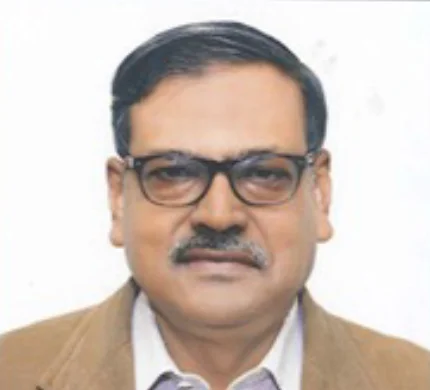
.
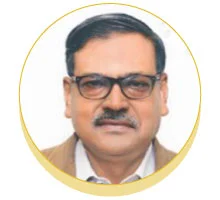
Sumit Bose
Former Finance Secretary, GOI
Sumit Bose was the Union Finance Secretary and Revenue Secretary in the Ministry of Finance, Government of India till his retirement from the Indian Administrative Service in March, 2014. In the Ministry of Finance he was also Secretary in the Departments of Expenditure and Disinvestment.
As Joint Secretary in the Department of Elementary Education, he was responsible for the launch of the Sarva Shiksha Abhiyan. He was also Secretary, School Education in Madhya Pradesh.
Currently he serves as an Independent Director on the boards of several companies and on the boards of various non-profits such as Vidhi Centre for Legal Policy, Jal Seva Charitable Foundation (WaterAid India), Parivaar Education Society (Kolkata) and Samaj Pragati Sahayog (Bagli, Dewas).
Sumit Bose
Former Finance Secretary, GOI
.

Sumit Bose
Former Finance Secretary, GOI
Sumit Bose was the Union Finance Secretary and Revenue Secretary in the Ministry of Finance, Government of India till his retirement from the Indian Administrative Service in March, 2014. In the Ministry of Finance he was also Secretary in the Departments of Expenditure and Disinvestment.
As Joint Secretary in the Department of Elementary Education, he was responsible for the launch of the Sarva Shiksha Abhiyan. He was also Secretary, School Education in Madhya Pradesh.
Currently he serves as an Independent Director on the boards of several companies and on the boards of various non-profits such as Vidhi Centre for Legal Policy, Jal Seva Charitable Foundation (WaterAid India), Parivaar Education Society (Kolkata) and Samaj Pragati Sahayog (Bagli, Dewas).
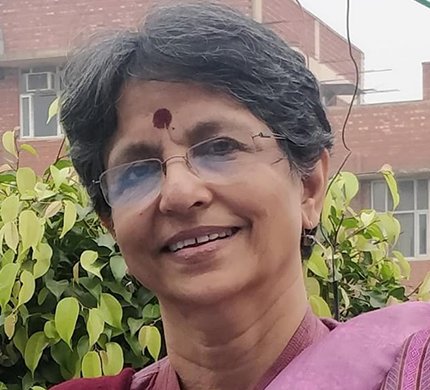
.
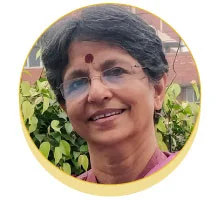
Professor Geetha B Nambissan
Former Chairperson ZHCES, SSS, Jawaharlal Nehru University
Professor Geetha B. Nambissan is a sociologist of education. She was formerly with the Zakir Husain Centre for Educational Studies, Jawaharlal Nehru University, New Delhi. Her research has focused on exclusion, inclusion, and social justice in education with particular reference to the schooling of marginalized sections of Indian society: Dalits, Adivasis, and the poor.
She has published widely in these areas. Her current research interests include the privatization of schooling and urban transformations and education. She is the editor of the ‘India’ section, in the Second International Handbook on Urban Education (Springer, 2017). Her recent publications include ‘Caste and the Politics of the Early “Public” in Schooling: Dalit Struggle for an Equitable Education’ (Contemporary Education Dialogue, July 2020) and Education and the Changing Urban in Delhi: Privilege and Exclusion in a Megacity (Perspectivia.net, 2021). She has been President of the Comparative Education Society of India.
Geetha B. Nambissan
Former Chairperson ZHCES, SSS, Jawaharlal Nehru University
.

Professor Geetha B Nambissan
Former Chairperson ZHCES, SSS, Jawaharlal Nehru University
Professor Geetha B. Nambissan is a sociologist of education. She was formerly with the Zakir Husain Centre for Educational Studies, Jawaharlal Nehru University, New Delhi. Her research has focused on exclusion, inclusion, and social justice in education with particular reference to the schooling of marginalized sections of Indian society: Dalits, Adivasis, and the poor.
She has published widely in these areas. Her current research interests include the privatization of schooling and urban transformations and education. She is the editor of the ‘India’ section, in the Second International Handbook on Urban Education (Springer, 2017). Her recent publications include ‘Caste and the Politics of the Early “Public” in Schooling: Dalit Struggle for an Equitable Education’ (Contemporary Education Dialogue, July 2020) and Education and the Changing Urban in Delhi: Privilege and Exclusion in a Megacity (Perspectivia.net, 2021). She has been President of the Comparative Education Society of India.
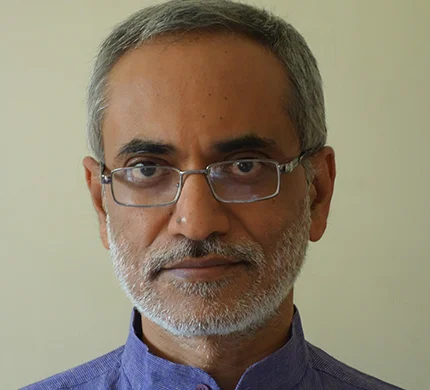
.
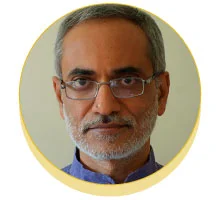
K. Subramaniam
Former Director, HBCSE, TIFR, Mumbai
Professor K. (Ravi) Subramaniam holds a PhD in Philosophy from IIT, Mumbai. He served as Director of the Homi Bhabha Centre for Science Education, TIFR, Mumbai from July 2016 to June 2021.
Professor Subramaniam has worked extensively in the area of mathematics education. He has taught various courses in mathematics education for doctoral students including: Introduction to Mathematics Education Research, Theoretical Perspectives on School Mathematics, Representations and Reasoning, and Philosophy of Education. He was a key contributor to course development of the M.A. Elementary Education programme at the Tata Institute of Social Sciences, and has taught the Pedagogy of Mathematics; Child development and Cognition courses in the programme.
He has mentored and supervised doctoral students across a range of topics including, learning of mathematics, teacher development and mathematics teaching, and science, technology and sustainability.
Professor Subramaniam has a range of publications to his credit in international and national peer reviewed journals. He has authored books for students and teachers, developed manuals and resources for teachers and published various research reports. Professor Subramaniam has made mathematics an enjoyable subject through his books titled – Maths for every child. Some of his key and co-authored publications include: Teachers’ construction of meanings of signed quantities and integer operation, (Journal of Mathematics Teacher Education, 2017) and Mathematics teacher training manual class I and class II. New Delhi: NCERT, (2010).
K. Subramaniam
Former Director, HBCSE, TIFR, Mumbai
.

K. Subramaniam
Former Director, HBCSE, TIFR, Mumbai
Professor K. (Ravi) Subramaniam holds a PhD in Philosophy from IIT, Mumbai. He served as Director of the Homi Bhabha Centre for Science Education, TIFR, Mumbai from July 2016 to June 2021.
Professor Subramaniam has worked extensively in the area of mathematics education. He has taught various courses in mathematics education for doctoral students including: Introduction to Mathematics Education Research, Theoretical Perspectives on School Mathematics, Representations and Reasoning, and Philosophy of Education. He was a key contributor to course development of the M.A. Elementary Education programme at the Tata Institute of Social Sciences, and has taught the Pedagogy of Mathematics; Child development and Cognition courses in the programme.
He has mentored and supervised doctoral students across a range of topics including, learning of mathematics, teacher development and mathematics teaching, and science, technology and sustainability.
Professor Subramaniam has a range of publications to his credit in international and national peer reviewed journals. He has authored books for students and teachers, developed manuals and resources for teachers and published various research reports. Professor Subramaniam has made mathematics an enjoyable subject through his books titled – Maths for every child. Some of his key and co-authored publications include: Teachers’ construction of meanings of signed quantities and integer operation, (Journal of Mathematics Teacher Education, 2017) and Mathematics teacher training manual class I and class II. New Delhi: NCERT, (2010).
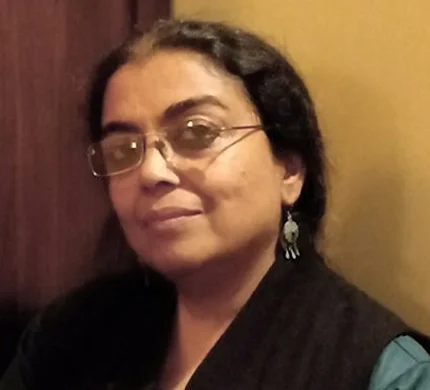
.
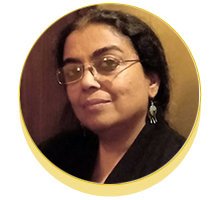
Professor Madhulika Banerjee
Department of Political Science, University of Delhi
Professor Madhulika Banerjee teaches courses on Public Policy, Comparative Politics, and Research Methods in the Department of Political Science at the University of Delhi. Professor Banerjee introduced a new course and project on the Politics of Knowledge in Development and has built a core group of researchers in this pioneering area. She has supervised and mentored a large number of doctoral students across a range of topics such as politics of knowledge, issues of development, urban administration, biotechnology in agriculture, media and society, and environmental politics. Professor Banerjee has several national and international publications to her credit. The key among these are: The Politics of Knowledge in Development: An Analytical Frame, (Studies in Indian Politics, 2021), Contemporary Conversations between Ayurveda and Biomedicine: From Reformulating Drugs to Refashioning Parameters (Asian Medicine, Vol 9, 2014, pp.141-170), Power, Knowledge Medicine:Ayurvedic Pharmaceuticals at Home and in the World, Orient Blackswan,
Hyderabad, 2009.
Professor Banerjee has been a recipient of several national and international research fellowships. Prominent among these is the award of a visiting researcher at the Max Planck Institute for Human Development in Berlin. Professor Banerjee has been the reviewer for the Austrian Academy of Sciences (research organization), Orient Black Swan (publisher), Indian Economic and Social History Review, Medical History, and Pratiman (Journals). She has served as member of Advisory Committee of Dastkar Andhra, a non-governmental organization working with handloom technology and weavers’ livelihoods in Andhra Pradesh, and as member of the Governing Body of Sambhaavnaa Trust, Palanpur, Himachal Pradesh.
Madhulika Banerjee
Department of Political Science, University of Delhi
.

Professor Madhulika Banerjee
Department of Political Science, University of Delhi
Professor Madhulika Banerjee teaches courses on Public Policy, Comparative Politics, and Research Methods in the Department of Political Science at the University of Delhi. Professor Banerjee introduced a new course and project on the Politics of Knowledge in Development and has built a core group of researchers in this pioneering area. She has supervised and mentored a large number of doctoral students across a range of topics such as politics of knowledge, issues of development, urban administration, biotechnology in agriculture, media and society, and environmental politics. Professor Banerjee has several national and international publications to her credit. The key among these are: The Politics of Knowledge in Development: An Analytical Frame, (Studies in Indian Politics, 2021), Contemporary Conversations between Ayurveda and Biomedicine: From Reformulating Drugs to Refashioning Parameters (Asian Medicine, Vol 9, 2014, pp.141-170), Power, Knowledge Medicine:Ayurvedic Pharmaceuticals at Home and in the World, Orient Blackswan,
Hyderabad, 2009.
Professor Banerjee has been a recipient of several national and international research fellowships. Prominent among these is the award of a visiting researcher at the Max Planck Institute for Human Development in Berlin. Professor Banerjee has been the reviewer for the Austrian Academy of Sciences (research organization), Orient Black Swan (publisher), Indian Economic and Social History Review, Medical History, and Pratiman (Journals). She has served as member of Advisory Committee of Dastkar Andhra, a non-governmental organization working with handloom technology and weavers’ livelihoods in Andhra Pradesh, and as member of the Governing Body of Sambhaavnaa Trust, Palanpur, Himachal Pradesh.
